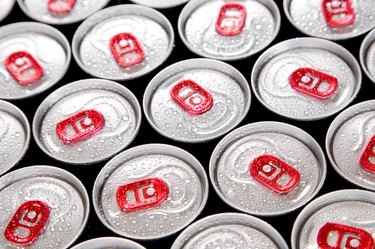
If late-night study sessions, workouts or work routines are commonplace for you, it might be tempting to reach for an energy drink to stay awake. XS Energy Drink is one such beverage, marketed as a calorie-free, quick source of energy.
Before you reach for an XS Blast or any other XS drink flavor, be sure you're aware of the possible side effects. While it may be acceptable to drink energy drinks in moderation, drinking too many can be harmful to your health.
Video of the Day
Video of the Day
Tip
An XS Energy Drink can provide a temporary energy boost without added calories. However, the caffeine and sucralose content may cause adverse health outcomes.
About XS Energy Drinks
XS Energy Drink is a beverage containing a blend of herbs, B vitamins and amino acids. You can choose from a variety of XS drink flavors, which contain no sugar, according to the manufacturer, Alticor Inc. The company also offers sports nutrition products, such as preworkout supplements and protein powders.
Instead of sugar, XS Energy drinks contain sucralose, which is an artificial sweetener derived from sugar, explains the Mayo Clinic. The typical can of XS Energy Drink contains less than 2 grams of carbohydrates, 0 grams of sugar and negligible amounts of fat and protein, according to the USDA.
It also contains various vitamins and minerals, including calcium and B vitamins, as well as roughly 80 milligrams of caffeine. That's about as much caffeine as you'd find in an 8-ounce cup of coffee, according to the U.S. Food and Drug Administration (FDA).
Ingredients may vary based on the XS drink flavor. For example, the XS Energy Cafe Mocha flavor contains 80 milligrams of caffeine, plus 2 grams of added sugars and 7 grams of protein, according to Amway. (Amway is the exclusive distributor of the XS Energy brand, per the Amway Global site.)
Benefits and Risks of Sucralose
Because XS drink flavors replace sugar with sucralose, they may be beneficial for people trying to lose weight or prevent weight gain, obesity and diabetes. Sucralose is approved for use in food as a non-nutritive sweetener, according to the FDA.
An April 2018 review published in the journal Obesity notes there can be benefits to replacing sugar-sweetened beverages with a non-nutritive sweetener such as sucralose. Non-nutritive sweeteners, aka high-intensity sweeteners, are commonly used as sugar substitutes because they are many times sweeter than sugar but contain little to no calories, says the FDA.
These sweeteners may be helpful for weight management and prevention of certain conditions, like Type 2 diabetes, cardiovascular disease and non-alcoholic fatty liver disease, according to the Obesity review. The benefits are even greater for individuals who consciously engage in calorie restriction and intentional weight loss, the authors add.
On the other hand, consuming non-nutritive sweeteners may negatively affect blood sugar, according to a September 2018 study published in the American Journal of Clinical Nutrition. The study involved healthy subjects with no comorbidities and a low habitual consumption of non-nutritive sweeteners.
The subjects consumed sucralose daily for 14 days, after which they showed a significant decrease in insulin sensitivity. The study suggests sucralose may affect glucose metabolism and the body's ability to control blood sugar.
Avoid XS in Excess
An October 2015 study published in the International Journal of Health Sciences (IJHS) acknowledges that energy drinks may improve physical performance. However, the IJHS also warns against excess energy drink consumption.
The concern lies primarily with the caffeine content of energy drinks like XS Blast varieties, XS Energy Cafe Mocha and other XS drink flavors. According to the IJHS study, caffeine consumption can improve memory, increase alertness and elevate mood — but consuming too much caffeine may result in:
- An increase in heart rate and arterial blood pressure.
- Symptoms of caffeine intoxication in doses equal to or exceeding 200 milligrams, including anxiety, insomnia, gastrointestinal upset, muscle twitching, restlessness and periods of inexhaustibility.
- Acute and chronic daily headaches.
- Stroke or epileptic seizures.
- Hallucinations in individuals who consume more than 300 milligrams of caffeine per day, possibly resulting from elevated levels of cortisol following caffeine intake.
- Dehydration during prolonged exercise in a hot environment.
- Sodium loss in urine, which affects the plasma volume and results in significant alteration of cardiovascular performance during exercise.
The detrimental effects of excess caffeine consumption may be exacerbated in young people. The IJHS study authors note that approximately two-thirds of energy drink consumers are 13 to 35 years old. In the United States alone, energy drinks are the second most common dietary supplement, according to the IJHS.
To ensure you enjoy the benefits of your next XS Blast, XS Energy Cafe Mocha or other XS drink flavors, practice moderation. The FDA cites 400 milligrams a day as generally a safe amount of caffeine for healthy adults.
Sensitivity to caffeine and the rate at which it's metabolized varies from person to person, adds the FDA. Certain conditions or medications can make you more sensitive.
Check with your doctor before drinking XS Energy Drinks if you think you may have caffeine sensitivity. You may also wish to swap out energy drinks for healthier alternatives, such as tea or water, as part of a healthy diet.
- Mayo Clinic: "Artificial Sweeteners and Other Sugar Substitutes"
- XS Blast: "XS Energy"
- U.S. Food and Drug Administration: "Spilling the Beans: How Much Caffeine Is Too Much?"
- Amway: "XS™ Energy Cafe - Mocha"
- International Journal of Health Sciences: "Energy Drink Consumption: Beneficial and Adverse Health Effects"
- U.S. Food and Drug Administration: "Additional Information About High-Intensity Sweeteners Permitted for Use in Food in the United States"
- Obesity: "Non-nutritive Sweeteners in Weight Management and Chronic Disease: A Review"
- USDA: "XS Energy Drink"
- Amway Global: "Amway Acquires XS Energy Brand"
- American Journal of Clinical Nutrition: "Sucralose Decreases Insulin Sensitivity in Healthy Subjects: A Randomized Controlled Trial"
- NIDA for Teens: Energy Drinks: A Boost in the Wrong Direction?